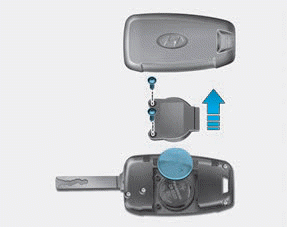Hyundai Palisade: Engine Control System / Variable Force Solenoid (VFS)
Hyundai Palisade (LX2) 2020-2025 Service Manual / Engine Control/Fuel System / Engine Control System / Variable Force Solenoid (VFS)
Description and operation
| Description |
Continuous Variable Valve Timing (CVVT) system advances or retards the valve
timing of the intake and exhaust valve in accordance with the ECM control signal
which is calculated by the engine speed and load. By controlling CVVT, the valve
overlap or underlap occurs, which in turn improves fuel efficiency, reduces
exhaust gases (NOx, HC) and improves engine performance by reducing pumping
loss, generating internal EGR effect, improving combustion stability, improving
volumetric efficiency and increasing expansion work. This system consists of
the Variable Force Solenoid (VFS) which supplies the engine oil to the cam phaser
or cuts the engine oil from the cam phaser in accordance with the ECM PWM (Pulse
With Modulation) control signal, the Cam Phaser which varies the cam phase by
using the hydraulic force of the engine oil.
Variable force solenoid (VFS) [intake] changes its force depending on the PWM
duty to control the stroke of the CVVT oil control valve (OCV) [intake] bolt.
The delivered oil rotates the rotor connected to the camshaft of the cam pager
and rotates the camshaft to the engine rotating direction (intake advanced /
exhaust retarded) or the opposite direction (intake retarded / exhaust advanced)
to change the phase angle of the cam.
Variable Force Solenoid (VFS) [Banks 1, 2/Intake]

Specifications
| Specification |
|
Item |
Specification |
|
Coil Resistance (Ω) |
7.0 - 8.0 [20°C (68°F)] |
Repair procedures
| Inspection |
| 1. |
Switch "OFF" the ignition.
|
| 2. |
Disconnect the VFS connector.
|
| 3. |
Measure resistance between the VFS terminals 1 and 2.
|
| 4. |
Check that the resistance is within the specification.
|
| Removal |
Variable Force Solenoid (VFS) [Bank 1 / Intake]
| 1. |
Switch "OFF" the ignition and disconnect the negative (-) battery terminal.
|
| 2. |
Disconnect the VFS connector (A).
|
| 3. |
Remove the mounting bolts (B), and then remove the VFS from the engine.
|
Variable Force Solenoid (VFS) [Bank 2 / Intake]
| 1. |
Switch "OFF" the ignition and disconnect the negative (-) battery terminal.
|
| 2. |
Disconnect the VFS connector (A).
|
| 3. |
Remove the mounting bolts (B), and then remove the VFS from the engine.
|
| Installation |
|
| 1. |
Install in the reverse order of removal.
|
 Purge Control Solenoid Valve (PCSV)
Purge Control Solenoid Valve (PCSV)
Description and operation
Description
Installed on the intake manifold, the Purge Control Solenoid Valve (PCSV) controls
the evaporative purge between the canister and the intake manifold...
 CVVT Oil Control Valve (OCV)
CVVT Oil Control Valve (OCV)
Description and operation
Description
Continuous Variable Valve Timing (CVVT) system advances or retards the valve
timing of the intake and exhaust valve in accordance with the ECM control signal
which is calculated by the engine speed and load...
Other information:
Hyundai Palisade (LX2) 2020-2025 Service Manual: USB jack
Schematic diagrams Circuit Diagram Description and operation Description The AUX, iPod and USB JACK on the center console is for customers who like to listen to external portable music players like the MP3, iPod, earphone, USB memory stick, CD player and etc...
Hyundai Palisade (LX2) 2020-2025 Service Manual: Electric Shift Button
Repair procedures Removal 1. Turn ignition switch OFF and disconnect the negative (-) battery cable. 2. Remove the console upper cover. (Refer to Body - "Floor Console Assembly") 3...
Categories
- Manuals Home
- 1st Generation Palisade Owners Manual
- 1st Generation Palisade Service Manual
- How to reset the power liftgate
- Changing Tires
- Theft-alarm system
- New on site
- Most important about car
Battery replacement

If the remote key is not working properly, try replacing the battery with a new one.
Battery Type: CR2032
To replace the battery:
Copyright © 2025 www.hpalisadelx.com



